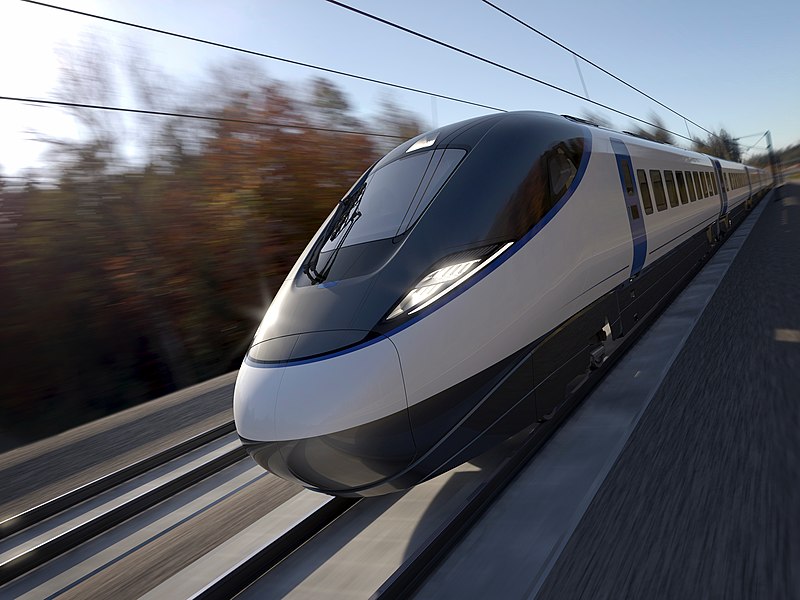
Recent weeks have seen rumours circulating that HS2, Britain’s newest High-Speed Rail project designed to connect central London with Manchester via Birmingham, will be heavily scaled back by the government in an attempt to find the fiscal headroom for pre-election tax cuts and to silence criticism that the project’s costs to the taxpayer are rising exponentially with seemingly little actual progress.
HS2’s budget has skyrocketed from £32.7 billion in 2012 to an estimated £100 billion today. The government’s plans to cancel the sections between Birmingham and Manchester, and 6 miles of tunnels between West London and Euston, could save upwards of £40 billion.
HS2’s budget has skyrocketed from £32.7 billion in 2012 to an estimated £100 billion today
Opponents of the project, typically supporters of these cuts, as well as citing the environmental impacts of tunnelling, often cite the fact that other nations such as China and Spain have built vast High Speed (HS) networks at a fraction, as much as a tenth, of the cost per mile.
In the last 15 years, China has built over 23,500 miles of HS track – for reference the entire of HS2 would span 330 miles. So why has Britain performed so poorly in comparison to countries such as China?
For one, the authoritarian government in Beijing can approve major infrastructure projects quicker, with less deliberation and public debate. This also means they can far more easily purchase and demolish buildings along the route, whereas in the UK, the democratic process and existence of ‘NIMBYism’, an opposition to new building projects, can hinder progress. China also has a far larger fund for infrastructure spending, with an economy that was double the size of the UK’s in 2008 and is now seven times as big.
Another issue is size. China is about 39 times bigger than the UK; British land is expensive as it is high in Demand and low in Supply, and so to create the perfectly straight tracks needed to run high-speed trains, Britain must get creative and turn to expensive tunnels and bridges, an issue China faces less.
Finally, experience is important. As the name suggests, this is only the second HS line Britain has built, after the Channel Tunnel. Problems long ago faced and overcome in other countries are new to British engineers.
Unlike European nations, many of which have vast HS networks, Britain faces unique challenges. The UK urban planning laws are among the most stringent, complex and at times baffling of anywhere in the world. The fact that an ongoing project can be so easily altered by the government, as evidenced by the 2021 Integrated Rail Plan which eliminated the section of HS2 that would go to Leeds, highlights the strange nuances of UK planning laws. These laws and their complexities increase the costs of reviews and initial development plans, as everything must fall in line with the planning laws.
The UK urban planning laws are among the most stringent, complex and at times baffling of anywhere in the world
Highly relevant modern challenges have also pushed up costs and slowed progress. The first is Inflation. While the base rate of Inflation in 2022 was just shy of 10%, the cost of Raw Materials rose by nearly 18%. This inevitably pushed up the costs of building the project.
Environmentalism also raised costs. The desire to preserve the natural beauty of the Chiltern Hills has led to a 10 mile tunnel being dug under them, with similar tunnels being dug to preserve ancient woodlands. Ambitions to make the HS Network Carbon Neutral have led to more expensive station designs, and Phase 1 alone will see 7 million new trees planted along the route.
Delays due to concerns about protecting wildlife, such as a £40mn Bat Tunnel side project paid for by the taxpayer, have also delayed the project while pushing up costs. The 2021 Integrated Rail Plan delayed the completion targets to save money in the short term, but this may raise costs overall as the project is slowed down. Phase 1 could now finish as late as 2033 instead of 2026 as originally planned, with Phase 2b, the leg to Manchester, finishing perhaps as late as 2045.
In recent years, many massive UK construction projects have gone over budget and been heavily delayed – London’s Crossrail; Northern Powerhouse Rail, which would use part of the Manchester HS2 line to connect Liverpool with Leeds at High Speeds; and Hinkley Point C Nuclear Power Plant, to name a few. But none quite to the extent and scale that HS2 has.
With so much focus currently placed on Levelling Up, it is shocking that when cuts are made to these projects, it is those in deindustrialised areas, like the Leeds leg of HS2, or the Northern Powerhouse Rail, that bear the brunt of cutbacks. A relaxing of planning laws and the development of expertise from the start would have been helpful 10 years ago, but that train has left the station for HS2. The lessons of what caused this project to go so heavily over budget and become so painfully delayed must be learnt, because the nation that pioneered the railways originally cannot be the one no longer capable of building them in the modern world.


